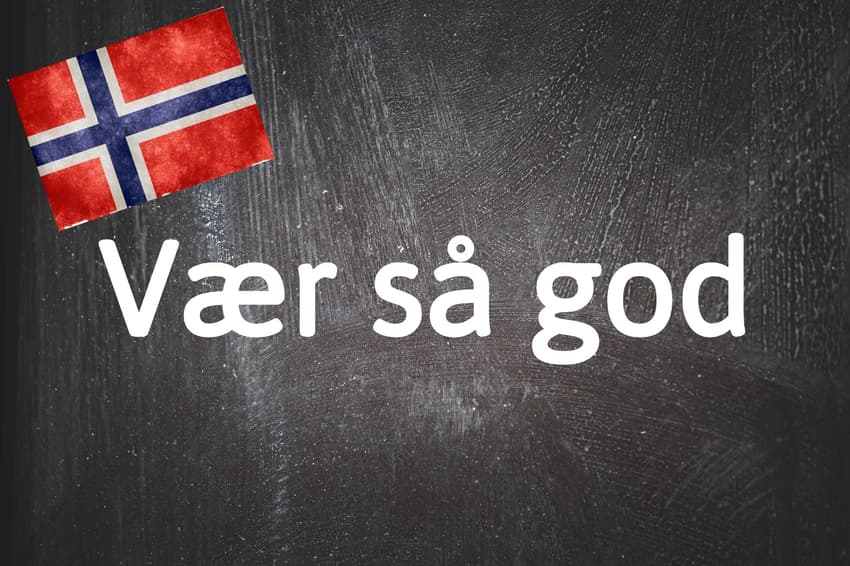Norwegian expression of the day: Vær så god

The phrase ‘vær så god’ is one you'll hear on an almost daily basis, so here's a look at exactly what it means, when to use it, and when not to.
What is vær så god?
Være is the imperative form of å være (“to be”), which you’ll probably know if you’ve taken Norwegian classes of any level.
Unlike the English “to be”, å være is easy to conjugate because it doesn’t change between the first, second and third person. In other words, “I am — you are — she/he is” becomes jeg er — du er — hun/han er. Who said Norwegian was a difficult language?
Back to the imperative form of “to be”, though. Most Norwegian imperatives simply remove the e from the end of the infinitive form: å løpe (“to run”) becomes løp! (run!). This is also the case with å være.
As such, vær så god is literally “be so good” or more loosely “be so kind”. French speakers might notice a similarity to the French term for “please”, s’il vous plait (literally: “if it pleases you”).
Why do I need to know vær så god?
Vær så god is usually translated as “you’re welcome” but can also mean something like “please” or “here you go”.
There are a few contexts in which you might hear or use this word.
Firstly, if someone says takk (“thank you”) to you, perhaps for holding a door open for you or after you do them a favour, you can respond værsågod (“you’re welcome”).
Vær så god can also be used passive-aggressively if you don’t receive a takk when you might expect it, so for example if you hold the door open and someone passes through it without a nod or word of thanks, you could mutter vær så god under your breath. Our advice would be not to overdo this, though: sometimes people don’t see the need to say thanks for small courtesies and this is more of a social norm than a deliberate lack of politeness.
The second context for using værsgo is when giving something to someone, such as when a waiter hands you your drink or cake, or when your boss hands out agendas at the start of a meeting. Here, it means something like “here you go”, similar to prego in Italian.
Comments
See Also
What is vær så god?
Være is the imperative form of å være (“to be”), which you’ll probably know if you’ve taken Norwegian classes of any level.
Unlike the English “to be”, å være is easy to conjugate because it doesn’t change between the first, second and third person. In other words, “I am — you are — she/he is” becomes jeg er — du er — hun/han er. Who said Norwegian was a difficult language?
Back to the imperative form of “to be”, though. Most Norwegian imperatives simply remove the e from the end of the infinitive form: å løpe (“to run”) becomes løp! (run!). This is also the case with å være.
As such, vær så god is literally “be so good” or more loosely “be so kind”. French speakers might notice a similarity to the French term for “please”, s’il vous plait (literally: “if it pleases you”).
Why do I need to know vær så god?
Vær så god is usually translated as “you’re welcome” but can also mean something like “please” or “here you go”.
There are a few contexts in which you might hear or use this word.
Firstly, if someone says takk (“thank you”) to you, perhaps for holding a door open for you or after you do them a favour, you can respond værsågod (“you’re welcome”).
Vær så god can also be used passive-aggressively if you don’t receive a takk when you might expect it, so for example if you hold the door open and someone passes through it without a nod or word of thanks, you could mutter vær så god under your breath. Our advice would be not to overdo this, though: sometimes people don’t see the need to say thanks for small courtesies and this is more of a social norm than a deliberate lack of politeness.
The second context for using værsgo is when giving something to someone, such as when a waiter hands you your drink or cake, or when your boss hands out agendas at the start of a meeting. Here, it means something like “here you go”, similar to prego in Italian.
Join the conversation in our comments section below. Share your own views and experience and if you have a question or suggestion for our journalists then email us at [email protected].
Please keep comments civil, constructive and on topic – and make sure to read our terms of use before getting involved.
Please log in here to leave a comment.